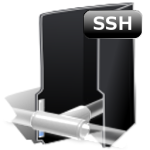Restricting remote access to a single IP address via SSH
The premise
 One of our clients has a Linux server. What we want to do is SSH in and set up port forwarding for RDP to a PC that’s inside the network. However, the user should be restricted to only access a certain IP address. For this example, I’m adding an account for Suresh, to access “remotehost.example.com”. He will use this to create a tunnel, forwarding port 3306 to a PC on the remote network.
One of our clients has a Linux server. What we want to do is SSH in and set up port forwarding for RDP to a PC that’s inside the network. However, the user should be restricted to only access a certain IP address. For this example, I’m adding an account for Suresh, to access “remotehost.example.com”. He will use this to create a tunnel, forwarding port 3306 to a PC on the remote network.
Setting up an SSH identity
$ sudo useradd --shell /bin/false --create-home suresh $ sudo passwd suresh
Disconnect, then copy your ssh identity file to the destination server:
$ ssh-copy-id suresh@remotehost.example.com
Testing the SSH identity
$ ssh suresh@remotehost.example.com $ suresh@remotehost.example.com's password:
Welcome to Ubuntu 14.04.1 LTS (GNU/Linux 3.13.0-32-generic x86_64)
* Documentation: https://help.ubuntu.com/
System information as of Tue Jul 29 19:08:30 NZST 2014
System load: 0.94 Processes: 165
Usage of /: 66.2% of 1.70TB Users logged in: 1
Memory usage: 38% IP address for virbr0: 192.168.1.2
Swap usage: 0%
Graph this data and manage this system at:
https://landscape.canonical.com/
0 packages can be updated.
0 updates are security updates.
-address-via-
The programs included with the Ubuntu system are free software;
the exact distribution terms for each program are described in the
individual files in /usr/share/doc/*/copyright.
Ubuntu comes with ABSOLUTELY NO WARRANTY, to the extent permitted by
applicable law.
Connection to remotehost.example.com closed.
you@yourpc ~ $
Note that it connects, but immediately severs the connection.
Setting security permissions
$ sudo nano /etc/ssh/sshd_config
Add the following (Note the indent in the second line. That’s important):
Match User suresh
PasswordAuthentication no
Restart the ssh service for the change to take effect.
$ sudo service ssh restart
If you try to connect without your SSH key, you should now see:
Permission denied (publickey).
Now, to make it so the user can only access a single remote host:
$ sudo nano /home/suresh/.ssh/authorized_keys
You should see one line in there. Pre-pend the line with:
permitopen="{target IP address}:{target port}"
Save and exit the file and give your newly configured SSH access a try
ssh -N suresh@remotehost.example.com
The ‘-N’ option tells the SSH session that you only want to open an SSH tunnel, as opposed to both a tunnel and a terminal session as per normal. Annoyingly you won’t even be returned with a nice ‘Successfully connected’ message (just a hanging process), but if you’re not hit with an error message you can be confident that the connection works.
Now the user can connect for port forwarding to a specific remote PC, but for nothing else.

